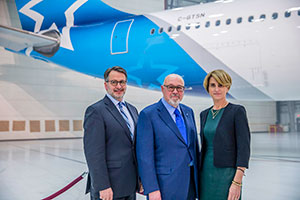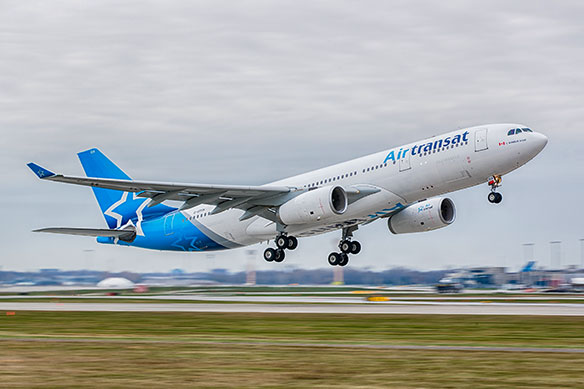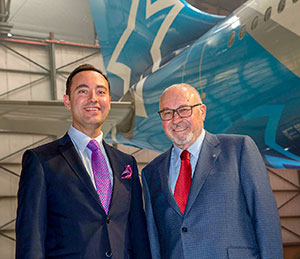
Transat: It’s all about building sustainable profitability
BOB MOWAT
Exciting times, indeed, as the company embarks on its new five-year plan – “Building Sustainable Profitability” – and sets a course towards creating the Transat of tomorrow.
Guiding the company along the way will be its new chief operating officer, Annick Guérard, who, in a conversation with Canadian Travel Press, explained that two of the key areas of Transat’s plan involve building and developing its hotel division and delivering operational efficiencies in its leisure travel business model.
It’s no secret that Transat has been working on its hotel division for a while now, with Guérard noting that: “We used to have an interest [about 35%] in Ocean Hotels, but we finally decided to [go] our own way. So building the hotel division is a very [important] part of our plan.”
For the moment, Eustache, along with the hotel division’s
newly appointed president, Jordi Solé will be in charge of Transat’s hotel initiatives.
However, Eustache, who joined Guérard to talk with CTP, explained that: “As soon as Annick [Guérard] will be really clear with the complete business that we have today, I will give her the hotel business and I will leave the company.”
Finding efficiencies
On the question of finding efficiencies for its leisure travel business, Guérard said that Transat will be looking for those in a number of different areas, telling CTP that: “One will be in strengthening our airline network – which is really important.”
Said Guérard: “We will do that on our two main markets South and Europe. We will totally revamp our fleet in order to meet that change in the network.”
The fact that Transat will be moving to an all Airbus fleet, Guérard said “will allow us to be much more efficient in the market from a cost perspective, but we’ll also be able to offer a consistent experience for our customers.”
The new equipment will also allow Transat to be much more efficient in both its South and its Europe markets, with Guérard explaining that: “it has always been a challenge [because] we have narrow bodies on the short-haul South [market] and wide-bodies on Europe. Now, we will be able to be much more flexible.”
As well, the company is also changing its approach to revenue management practices, bringing new competencies on board and relying more and more on mathematical modelling, she noted.
As for distribution, Guérard said that Transat continues “to count on a multi-channel distribution,” investing “more and more in direct distribution; working on the Internet; on the Web interfaces – not only to sell, but more to interact with clients.”
And in doing that, Transat’s COO said it was all about making things easier and more transparent for the company’s customers.
Targeting leisure
Guérard emphasized that Transat targets the leisure traveller – both the vacation segment and the VFR section of the market – and “based on everything we know so far, [these travellers] are looking for a good price and a service that is very simple, efficient and enjoyable.”
She continued: “So everything we are doing in terms of developing our services and products is around those priorities. So, when we talk about digital, it’s to simplify the interactions we can have with the clients throughout all of the customer’s journey.”
As a result, Transat is investing “massively” in the digital space, with Guérard telling CTP: “We’re now looking for more voice recognition, voice surge, chat online and so forth, and making sure that we have a centralized file around the customer, so that we know who we’re dealing with.”
Another key element of Transat’s plan, although she admits that it’s not that sexy, is the company’s cost reduction initiative.
Pointing to the tight margins of the business, Guérard said that: “We have an important target in terms of achieving millions [of dollars] in cost reductions over the next five years in order to remain competitive in the market. We do it, not necessarily just for the sake of cutting costs, but to be able to offer the best price in the market.”

Jean-François Lemay, President, Air Transat, Jean- Marc Eustache, President and Chief Executive Officer, Transat, Annick Guérard, Chief Operating Officer, Transat
Definitely different
On the question of what makes Transat different, she points to the fact that its business model is different, in that the company operates in all sectors of the leisure travel business – and only in the leisure travel business.
“We have travel agencies. We have the airline; tour operating; receptive; and outgoing as well; and now [we’re] getting more and more into the hotel business. And that allows us to have a stronger knowledge around customers; to have more insight [into] customers’ interests and priorities. We know something about leisure customers for sure and that allows us, as well, to better control the experience along the value chain,” she said.
A further difference, Guérard said is that Transat “is very focused on our target clientele. As I said, we don’t want to be everything to everybody. We have always and we will continue to focus on the leisure traveller which is very important.”
The result, she explained is that “whenever we develop [new] products and [new] services, it’s all about the leisure traveller. We’re not trying to serve the business traveller or to serve other kinds of customers. We remain focused [on the leisure traveller] and that’s important for us.”
By doing this, Guérard said that Transat has discovered that its clients are looking for point-to-point service; things need to be simple and efficient; and it needs to be easy to deal with Transat.
“The core of what we do – and what we will continue to do – is around offering point-to-point service to multiple destinations with great service and extremely attractive prices.”
Considering that Transat is celebrating its 30th anniversary, it seemed obvious to ask Guérard and Eustache how the Canadian market has changed over three decades and where it might be headed in the future.
Product knowledge
On the product side, Guérard said what Transat has found interesting is that a number of years ago, the company “had anticipated that in terms of consumers, Canadian consumers buying product, everything would become à la carte.”
Surprisingly, said Transat’s COO what the company has seen is “a very high resilience in all-inclusive packages which continues to grow year after year [both] in terms of offer, but also in terms of interest as well in the Canadian market.”
“That’s a trend that we see that we still find fascinating,” Guérard told CTP. “Remember, we were investing or looking at investing in all the different technologies that would allow us to sell FIT – everything à la carte.”
In many ways, the changing quality level of all-inclusive packages may well have driven their resilience in the Canadian market, with Guérard pointing out that “what sells now is much more four and a half stars to five stars. I would say that [trend] is everywhere – in all the provinces within Canada – that’s very strong.”
She also said that Transat is seeing “much more interest in everything that’s around either luxury or food. People are looking for quality food that’s really important.”
Surprise, surprise
Back on the distribution side of things, Guérard observed that “15 or 20 years ago, we had anticipated that bricks & mortar [agencies] would decrease as a booking channel with the arrival of the Internet and consumers wanting to shop and book in their own way.”
She continued: “We’ve seen a decrease, but it hasn’t been significant, and we are finding out that people have depended on digital tools to shop, but they’re overwhelmed with information and people are calling us and saying ‘I spent 15 hours looking for a deal and I’m not going to do this anymore,’ and so they call our travel agents to take care of their trip.”
With people putting more value on their time – because they’re so busy – Transat’s COO said that travel agencies are still “a very important component of the whole chain.”
“That’s a trend that we’ve seen over the years that has surprised us and that’s why we are still investing in our travel agency network,” she added.
Transat:
ON COURSE TO SUCCESSION
“Another significant step forward taken last year was the appointment of Annick Guérard as chief operating officer. It is an open secret that Annick is preparing to succeed me as chief executive officer of Transat. Her latest appointment is the culmination of a selection and development process that we have carefully shepherded over the past several years,” said Transat president & CEO, Jean-Marc Eustache in his March 2018 presentation to shareholders.
He also made it clear, in that same presentation, that: “Annick is the face of the new generation that is gradually taking over the reins. She has been in her new role for more than four months now, overseeing the full spectrum of our existing leisure travel business, from flight operations to packaging to marketing. This has left me free to devote all my energy to orchestrating our hotel development plan.”
More recently, in a conversation with Canadian Travel Press during the company’s 30th anniversary celebrations in Toronto, Eustache was asked about the timing of his departure, and said: “As soon as Annick will be really clear with the complete business that we have today, I will give her the hotel business and I will leave the company.”
TIME TO RETIRE
Transat’s founder observed: “I always said when I’m going to leave the company – the day-to-day – I’m going to leave the company. And you know why, it’s very easy to understand. If you stay there and you started this company 40 years or so ago, you’re going to still look at it; you’re going to still, you know, say things that are no good for the new people.”
Ultimately, Eustache told CTP: “When it’s time to retire, it’s time to retire. You leave the company. You leave the company in good shape, with the right person – that’s what I want. I could stay for six months to be sure that everything is okay, but that’s not my thinking.”
In fact, he said: “Me, I want to leave, and it’s the new people that will take over. I’m saying the same thing to my Board people. I’m saying, you know, the old board member, around my age, we’re all going to have to leave. We’re going to have to bring younger people, [with] different thinking in and onto the Board [of Directors]. Then we’ll leave – one after the other – and put the new generation in charge.”
But he admitted that: “At one point, you have to make the decision. It took me a while before accepting that and to be clear in my head, but today, no problem at all. And it’s going to be tough for me because I never did anything else but just work.”
ACCOMMODATING THE FUTURE
Ask Jean-Marc Eustache why it’s so important for Transat to be in the hotel business, and he’ll tell you the following: “Well, there are a lot of reasons. First, you don’t make money any more with the tour operators – the tour operators today, [are] kind of a machine to distribute the product. Travel agencies, you know, the margins are so small and you [make] one mistake and ‘poof’ you don’t have any more margin – that’s one of the reasons.”
Transat’s president and CEO continued: “The second reason is where do you make the money? You make the money when you produce something. Where do we [Transat] produce something – with the airline and with the hotels. And we’re not doing something different – TUI has been doing the same thing for a long time with RIU. Thomas Cook is doing it. Here, Sunwing is doing it with Diamond and doing very well. Apple is a group in the United States – they used to be just a tour operator. Today, they are more a hotel business. They have 52 hotels that they manage under the name of AMResorts.”
Eustache also explained that the company’s hotel division will also give it a little bit more control of the product that it’s selling in Canada, noting that in this country “our hotels will be sold only through Transat – that’s in Canada. But it’s not in the Canadian market where you make money in hotels. The main market is the United States.”
JUST BE PATIENT
In the beginning, he noted, Canadian vacationers will be filling 50% of those hotel rooms, “but two or three years after, Canadians will be 20% of the market. The market will be US. It will be European. It will be local. In Mexico, in the summer, it’s all local [business].”
Currently, he said, the company is looking at land, and it is also looking at purchasing existing resorts, but each option has its own issues.
However, over the next seven years, Transat’s plan is to have 5,000 rooms on the market in key destinations that include Mexico (Cancun), the Dominican Republic (Punta Cana) and, in all probability, Jamaica by 2024.
As for the timing of this, Eustache told CTP: “That’s the problem. I would have to say to the shareholders – because we’re a public company – be patient.”


